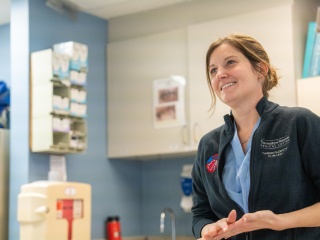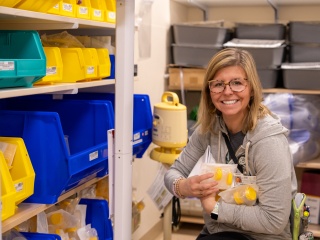
Pregnancy Care
Pregnancy Care at UVM Health
At University of Vermont Health, we provide comprehensive, personalized care at every step of your pregnancy. Patients across the region come to us for our expertise and patient-centered approach. With locations across Vermont and northern New York, exceptional care is available to you no matter where you live.
Our team recognizes the importance of individual choices during pregnancy and childbirth. We welcome patients of all races, ethnicities, abilities, gender identities and sexual orientations.
Why Choose UVM Health?
As a leading pregnancy and childbirth program in the region, we offer:
- Dedicated team: Our pregnancy and childbirth teams include board-certified obstetricians, certified nurse-midwives, advanced practice providers and highly trained nurses. Every team member is focused on helping you have a healthy pregnancy and baby.
- Midwifery services: Midwives offer a holistic approach to pregnancy, labor and delivery and support natural interventions for patients who desire them.
- Advanced care when needed: If health issues occur during pregnancy, you have access to highly trained specialists, including maternal-fetal medicine physicians, and the latest technology in our maternal care center and neonatal intensive care unit (NICU).
Services We Provide
Obstetric care during pregnancy helps us ensure that you and your developing baby are healthy. Our standard schedule of visits includes routine monitoring, testing and education. If any issues arise, your obstetric provider has the knowledge, tools and resources across our health system to provide the care you need.
Midwives provide comprehensive pregnancy and gynecologic services for low-risk pregnancies and partner with maternal-fetal medicine physician colleagues to care for high-risk pregnancies. These highly trained professionals offer a holistic approach to care that supports the use of natural treatments whenever possible.
If you have a low-risk pregnancy, your prenatal care will include standard imaging and lab tests. We typically perform an ultrasound at your initial visit and at 20 weeks. In early pregnancy, we use lab tests to check your blood type and overall health. Later in pregnancy, we check you for conditions such as gestational diabetes and group B streptococcal infection.
You may also choose to have screening tests to determine if you are at increased risk of having a baby with a genetic abnormality. Not all pregnant people choose to have this screening. Your provider will explain your test options and help you decide if it’s right for you.
If you have a positive result, our fetal diagnostics specialists can perform additional tests. These caring professionals help you understand test findings and make decisions about your pregnancy.
Pregnancy is a time of change for you and your family. We provide education and resources throughout your pregnancy to help you manage those changes. Topics we discuss include:
- Birthing classes
- Breastfeeding, breast pumps and lactational support
- Childbirth, what to expect and pain management options
- Circumcision
- Community resources, including social workers, mental health counselors and psychiatrists
- Preventing pregnancy after delivery
- Support groups
- Smoking cessation
If you have a complex pregnancy or concerns before becoming pregnant, your obstetric provider may refer you to a maternal-fetal medicine specialist at UVM Health. As experts in managing high-risk pregnancies, we provide advanced diagnostic and treatment approaches, as well as support, guidance and compassion throughout your pregnancy and delivery.
Family Care at Home
We provide expert and compassionate at-home care and support services to pregnant people and new parents, as well as physical therapy and other supportive care for children and families in Chittenden and Grand Isle counties.

Your Personalized Pregnancy Care Plan
Check out MyChart Care Companion — a new tool with helpful reminders, quick check-ins and easy-to-read tips to help you manage your pregnancy and postpartum care. Ask your provider or login to MyChart to get started.

Awards & Certifications
Newsweek: America's Best Maternity Hospitals
Newsweek has included UVM Health's anchor academic medical center and Level 1 Trauma Center that serves the region on its ranking of America’s Best Maternity Hospitals after assessing the quality of perinatal care, operative obstetrics, patient education and counseling, accommodation and service, and nurse and midwife staffing.
March of Dimes
The March of Dimes awarded Golisano Children's Hospital an ‘A’ grade for perinatal services in their 2024 Report Card – making Vermont the only state to achieve an ‘A’ ranking in 2024 and setting a new benchmark for maternal and infant health across the United States.
Locations near you
Share your location to see nearby providers and availability
353 Blair Park Road
Williston, VT 05495-7530
37 Haystack Road
Hinesburg, VT 05461-6613
28 Centre Drive
Milton, VT 05468-3104
3 Timber Lane
South Burlington, VT 05403-7205
206 Cornelia Street
Suite 105
Plattsburgh, NY 12901-2779
111 Colchester Avenue
Main Campus, East Pavilion, Level 4
Burlington, VT 05401
16 Third Street
Suite C
Malone, NY 12953-1305
130 Fisher Road
MOB-A, Suite 1-4
Berlin, VT 05602-9000
116 Porter Drive
Middlebury, VT 05753-8501

